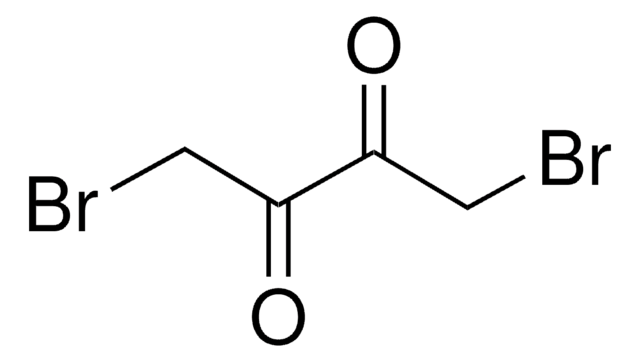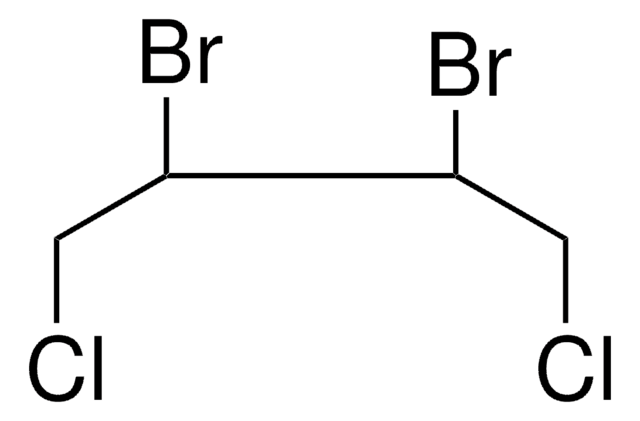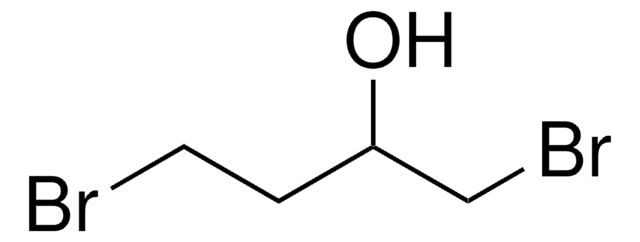237574
1,4-Dibromo-2,3-butanediol
95%, mixture of R,R and S,S isomers
Sign Into View Organizational & Contract Pricing
All Photos(1)
About This Item
Linear Formula:
BrCH2CH(OH)CH(OH)CH2Br
CAS Number:
Molecular Weight:
247.91
MDL number:
UNSPSC Code:
12352100
PubChem Substance ID:
NACRES:
NA.22
Recommended Products
Assay
95%
form
solid
mp
82-84 °C (lit.)
SMILES string
BrCC(O)C(O)CBr
InChI
1S/C4H8Br2O2/c5-1-3(7)4(8)2-6/h3-4,7-8H,1-2H2/t3-,4-/m1/s1
InChI key
XOWDQAHYPSENAC-QWWZWVQMSA-N
Looking for similar products? Visit Product Comparison Guide
General description
1,4-Dibromo-2,3-butanediol reacts with aqueous alkaline sodium arsenite to yield mixture of DL-2,3,4-trihydroxybutylarsonic acid and DL-2,3-dihydroxybutane-1,4-bis(arsonic acid).
Application
1,4-Dibromo-2,3-butanediol has been used in the preparation of diquaternary gemini surfactants.
Signal Word
Danger
Hazard Statements
Precautionary Statements
Hazard Classifications
Eye Dam. 1 - Skin Irrit. 2 - STOT SE 3
Target Organs
Respiratory system
Storage Class Code
11 - Combustible Solids
WGK
WGK 3
Flash Point(F)
Not applicable
Flash Point(C)
Not applicable
Personal Protective Equipment
dust mask type N95 (US), Eyeshields, Gloves
Choose from one of the most recent versions:
Already Own This Product?
Find documentation for the products that you have recently purchased in the Document Library.
Customers Also Viewed
Surface activity and premicellar aggregation of some novel diquaternary gemini surfactants.
Rosen MJ and Liu L.
Journal of the American Oil Chemists' Society, 73(7), 885-890 (1996)
A M Kessling et al.
American journal of human genetics, 42(3), 458-467 (1988-03-01)
We have investigated the frequencies of RFLPs of the apolipoprotein (apo) AII gene and of the apo AI-CIII-AIV gene cluster in 109 men, selected from a random sample of 1,910 men aged 45-59 years, to cover a wide range of
Gerasimos M Tsivgoulis et al.
Chemistry and physics of lipids, 148(2), 97-104 (2007-06-09)
The reaction of DL-1,3-butadiene diepoxide and of DL-1,4-dibromo-2,3-butanediol with aqueous alkaline sodium arsenite, "Na(3)AsO(3)", gave mixtures of the title arsonic acids which can be separated by anion exchange resin. Characterization of by-products leads to a better understanding of these reactions.
Riikka Mäkelä et al.
The Journal of clinical endocrinology and metabolism, 88(8), 3823-3828 (2003-08-14)
Myeloperoxidase (MPO) is an oxidative enzyme present in phagocytes and atherosclerotic lesions. The MPO gene has a promoter polymorphism -463G/A, which leads to high (GG) and low expression (AG, AA) genotypes. We investigated the effect of long-term hormone replacement therapy
Our team of scientists has experience in all areas of research including Life Science, Material Science, Chemical Synthesis, Chromatography, Analytical and many others.
Contact Technical Service















